Pendleton Revolution
Chapter 1
Andrea Yuriness’s First Letter to Her Benefactor
[I have read many poems and passages over the years. Among them were love stories that warmed my heart like the morning sun, history books brimming with war and blood, and literature rife with beautiful prose. Would you believe me if I told you that none of them came close to a marvelous thing that recently happened to me? The last few days have been more wonderful and fantastical than any poem or story I have ever read.
I hope you do not find my wonderment and awe excessive. My intention is pure, I assure you. I simply wish to tell you that your decision to sponsor me has completely changed my life. You have given me an opportunity and have fueled my hopes and dreams.
Honestly, the news of your visit and your promise to sponsor one of the children at my orphanage did not surprise me. Everyone knows that the great love story of Archduke and Archduchess Pendleton has inspired many educated and accomplished men to take an interest in becoming patrons to us orphans. In fact, my orphanage is the largest in the capital, so potential benefactors visit often.
However, your unusual approach to selecting the recipient of your sponsorship surprised me. Increasingly more people are seeking to support orphaned girls, but it is the beautiful and intelligent girls who typically catch the interest of these potential patrons. That is why I consider myself lucky—I would never have dreamed of receiving your patronage.
I heard you offered to support an orphan with the greatest talent and potential, regardless of gender. Thanks to you, the priest pulled me aside four days ago and told me the good news.
Having already reached the age of eighteen, I know most of what goes on in the orphanage. As far as I am aware, you are the only gentleman who did not demand a beautiful, slender, doe-eyed girl with a graceful voice to sponsor. Children like me, who have neither the talent nor the beauty to join the world of aristocrats, do not even dare to dream of receiving patronage. What you have given me extends beyond a simple sponsorship—you have given all of us hope. The kindness with which you have graced our orphanage will fuel the hopes and dreams of all the children here.
Therefore, I am writing to express my gratitude for the opportunity and honor that comes with receiving your support. I have also noted the discipline of my interest, as per your request. Starting tomorrow, I shall write to you whenever I get the chance. I am excited for what is in store for me, and hope that I may delight you with my stories of student life.
I pray I have expressed enough awe and gratitude for my unexpected stroke of luck. Please find my wishlist attached on the next page. I have never been taught the rules of etiquette, so please forgive me graciously if I have offended you in any way. As I am not good with words, I am also worried that my letter is either too short or overly verbose.
P.S. To my unnamed patron, please enlighten me on how I should address you. I heard that with anonymous benefactors, as was the case with Archduke Pendleton’s patronage, a moniker is crucial in this kind of correspondence. If, like other sponsors, you would prefer not to reply, please have someone else write on the envelope how I should address you.
Sincerely, Ed Yuriness, Forever Under Your Grace]
* * *
The reply was smeared with ink, here and there, and the misspellings were crossed out and rewritten.
[Dear Ed,
I am pleased to meet you through our correspondence. I am the anonymous benefactor who has chosen to support you. First, let me preface by saying that I have asked my servant to write and revise my letter to reflect the courtesy I lack in writing. Less than two years have passed since the boy acting as my scribe has learned to read and write, so please overlook any slips of the pen you may notice.
I have heard that benefactors do not typically exchange correspondence with their protégés. However, as you have rightly pointed out, I have decided that it would be a good idea to set the rules and appellations between us before beginning my patronage. After this letter, I shall refrain from writing more.
I am delighted to hear that my chance decision has presented you with a meaningful opportunity. At the same time, I feel a prick in my conscience that a choice I had made so lightly would have such a significant impact on you. At the risk of upsetting you, I must begin my patronage by explaining why I have come to support you. Yes, I must be honest with you, even though I know you may be disappointed.
It is a personal matter, but having recently reached a marriageable age, I have been under a lot of pressure to find a suitable bride. However, I have grown sick of all the pestering I have been receiving for a while. To escape the pressure of marriage, I have decided to become an anonymous benefactor, in fitting with the current fashion. I hope this will aid in my pursuit of finding a fine woman for myself. Since this was nothing more than an excuse to attract a woman, I did not care for the gender of whom I would be supporting. If I was going to offer patronage anyway, I decided it would be better to give the opportunity to the most promising student.
That is how I found you, Ed. The enthusiasm in your letter tells me that you will not disappoint. Regardless of how I came to sponsor you, I will see it through to the end. I promise to support you with whatever experience and learning you desire to the best of my abilities.
As for the appellation, you may address me however you wish. After some asking around, I have learned that most patrons use the nickname used by Archduke and Archduchess Pendleton during their youth—Daddy-Long-Legs. I am unsure if a fully-fledged young man like yourself would consider me long-legged. There is also the issue of being called “mister” at my age, but in any case, let us settle on an acceptable appellation. You may call me “Mr. Benefactor.”
After this letter, please do not expect another reply from me unless a response appears necessary, or at least not until my servant has mastered the basics of spelling. However, please do let me know if you would consider my response to be a delight rather than a burden. I am only worried that our correspondence may put undue pressure on you.
I wish you the best of luck with your studies.
Sincerely,
Mr. Benefactor]
* * *
Archduke Pendleton had been renowned for his good and gentlemanly nature since he was a young boy. As the emperor’s youngest sibling, he lived a life of abundance. At the same time, he was virtuous and sympathized with the poor and the less fortunate. As soon as he became an archduke at the age of eighteen, he started to visit orphanages and sponsor children.
One day, he became curious about a recipient who would send him letters in return for his sponsorship. Veiling his identity as the benefactor, he approached the recipient. However, he didn’t hide his real name from her—Jervis Pendleton. His recipient, a young lady named Jerusha Abbott, guessed from his surname that he was an aristocrat. To their surprise and tragedy, Jervis fell in love with the orphaned girl he sponsored. Falling in love didn’t give him the right to demand to be loved back. Such were the kinds of principles by which Archduke Pendleton lived. In fact, he was afraid that revealing his identity as her benefactor would stop whatever affinity they had entirely.
While he agonized about what to do, Jerusha Abbott busied herself with looking into studying and working abroad. Fearing that Jerusha might slip through his fingers forever, Archduke Pendleton prematurely proposed to her. Though he didn’t reveal his identity as her benefactor, he did confess his noble background before asking for her hand in marriage.
Unfortunately, he was turned down immediately. Jerusha Abbott was afraid of integrating herself into high society, and not in her wildest dreams did she suspect that her admirer was, in fact, her benefactor. Having met this dashing young man from an entirely different world, she had yet to reveal to him that she was an orphan. This was precisely what impeded her from deepening her relationship with him. Falsely believing that Jerusha was in love with someone else, Jervis Pendleton parted ways with her.
Later, Jerusha shared her inner turmoil with her benefactor. She explained that she was, in fact, in love with Jervis Pendleton, but the difference in class and the fact that she had not revealed to him that she was an orphan had stopped her from pursuing him back.
When Jervis received this letter, he cried his heart out. He was so lovesick that he became bedridden. Eventually, the two bared their souls to each other, and it became the love story of the century. Jerusha adopted the Pendleton name and became the country’s sole archduchess, despite there being three archdukes.
The love story between the beautiful, brilliant archduchess and Archduke Pendleton inspired other young noblemen to pursue similar romances. These young men would go on to support and shape orphaned young girls into whatever ladies they envisioned for themselves. Captivated by the idea of courting and making love with frail young women, some evil noblemen used patronage as an excuse to act on their vilest desires. Happy endings were not without their consequences.
A growing number of sordid men began to prey on and ruin the lives of these lower-class women under the guise of patronage, and this eventually developed into a broader societal problem. As the issue grew in severity, the emperor told the nobles to stop such “depraved and disgraceful” acts of patronage. Unfortunately, his warning backfired. If anything, such acts only grew more popular.
Against this new backdrop, Ed Yuriness’s patron was one of a kind indeed. His reason for supporting her was to escape the pressure of marriage and pretend to search for a bride because sponsorship was in current fashion among the nobility. Ed thought his reasoning was perfectly acceptable. However, the patron went so far as to apologize for being self-centered and putting a damper on her excitement.
Should Ed take her benefactor’s words at face value? No, the world was much too dangerous to do that. However, doubting his intentions wasn’t a good approach either. In any case, her patron’s letter painted a consistent and convincing picture of his character. He had never cared about her gender from the start, and Ed Yuriness was quite far from the ideal female protégé that young noblemen dreamed of fooling around with. When she asked to study swordsmanship, martial arts, military arts, and battle tactics, her benefactor had happily obliged. He even offered her a sword—her first—happy to finally find an owner for the blade. It seemed he had already been informed of Ed’s aspirations by the abbess, the orphanage matron.
“He’s a good man,” Ed remarked calmly as she put away the sword, which had been the first box she opened.
Her closest friend, Maria Helezen, was reading the letter with her. With a shrug, she put it down.
“Yes, he does seem like a good person, but it sounds like he thinks you’re a boy.”
“No way,” Ed replied flatly. “He must’ve looked into who he is supporting. Background checks are one of the first things a benefactor does. If not, he must’ve at least received a portrait of me.”
Eighteen-year-old Andrea Yuriness, also known as Ed, was one of the oldest orphans at Kalabasta Orphanage—the most renowned orphanage in the capital. She took the letter and folded it neatly. After carefully slipping it back into the envelope, she put it inside her cabinet for safekeeping. The corners of her lips curved up, unable to contain her excitement, as she looked down at her new sword.
Andrea was a young girl, but she had piercings, and her blonde hair was trimmed short like a boy’s. She had always been interested in politics, military arts, and battle tactics, and had a sturdy build to boot. She wanted to study martial arts. To her delight, not only did her benefactor accede to her request, but he also gifted her a sword. No honor was greater for a poor, lower-class orphan than receiving a sword from a noble.
It was her first time running her hand over a fine, expensive blade. Afterward, Andrea eagerly moved on to the second box from the benefactor. While she opened the second gift, Maria Helezen remained otherwise unfazed.
With a shrug, Maria mused. “I can’t say, but based on his response, he doesn’t seem to be the type to care for such things. A background check is the least he can do, considering you might become a member of his family someday.”
“Oh, never in a million years will that happen to me.” Andrea snorted.
“I do agree. He should’ve at least gotten a portrait of you,” Maria continued musing as she stroked her chin. “But that is precisely what worries me—your portrait. Hey, are you even listening?”
“Huh.”
“What’s wrong?”
“You’re right. He must think I’m a boy.”
Ed took a male uniform from the box, along with a postcard. The card presented the uniform as hers and explained that if it tore, and she needed a new one, she could always send him a letter asking for one. Maria, craning her neck over Ed’s shoulders, covered her mouth. She let out a gasp of feigned pity.
“What did I tell you? Your portrait is precisely the problem, what with that face of yours. It can’t be helped.”
“Shut up,” Ed snapped.
Maria abruptly clasped her hands behind her back and twirled around nonchalantly.
“Congratulations on getting a good benefactor, Ed.”
“What should I do? Should I write to him and tell him I’m actually a girl? I doubt he’ll look into any more information about me from here on out.”
“Why go out of your way? Just relax, take his support, and focus on your studies. One bad interaction with a nobleman could ruin your life.”
The ever-so-clever Maria dramatically raised the hems of her skirt and pretended to curtsy like a noblewoman.
“If he does find out later, you can just say, ‘Oh dear. I thought you knew I was a woman.’ Then, pretend to be hurt and shed a tear for good measure. It’s his fault anyway for not doing a proper background check.”
“What if he starts demanding weird things from me when he finds out?”
“Oh my, from you?” Maria’s uniquely beautiful and graceful smirk bloomed like a flower as she gently dismissed Andrea’s worries. “Wake up, Ed. With a face like yours, you’re better off wooing a lady than a gentleman. If you’re scared, why don’t you seduce a noblewoman to come to your rescue before he finds out?”
“Watch it.”
“Instead of worrying, become a dashing knight and get me out of here already.”
As Maria sulked, Andrea found herself playing along as usual.
She shrugged as if she couldn’t help it and said, “Yes, yes. As you wish, my fair lady.”
“At least you’re handsome, Ed. No one can be handsome and beautiful at the same time.”
“I appreciate the compliment, my lady,” Andrea replied sarcastically before quietly closing the box.
Her benefactor’s gift was of no use to her. Still, she resolved to store it safely in the back of her drawer and make a note of this act of kindness.
* * *
“We must’ve sent him too much money, but how would we know how much a commoner spends on average?” the man clucked. “Apparently, Ed considered sending the money back but decided to enjoy the extra cash instead. Do you know what he said after that?”
“I don’t care.”
“Fine, I’ll read it aloud, just for you.”
“I said, I don’t care.”
“He said, and I quote, ‘Is this not just a small sum to you? Oh, how I wish that were the case. Please forgive me.’ How adorable is that?” a man with a thin, elegant face asked jovially, the ends of his eyebrows curving down.
The man’s auburn hair—trimmed short for style—radiated like flames, and his blue-violet irises shined from the center of the playful curvature of his eyes. The fire flickered in his eyes like shooting stars, making his chiseled face look almost mythical. A bitter smile decorated that mischievous, playful face. He was Lucas Garvin, the Baron of Gustaf, widely known even in the capital as a libertine.
Leisurely, he folded the letter back up. Then, he cast his eyes sideways to catch a glimpse of the man across from him. There sat a raven-haired man with pale blue eyes mixed with a hint of silver as they gazed coolly back at Lucas.
Maintaining his air of indifference, he turned his gaze to the fireplace as he spoke.
“The problem is, he needs a proper uniform and a sword to keep his head up at the academy. Too bad the uniform doesn’t fit him. He’s in for some trouble.”
This second man was Leeman Priccello, the Margrave of Creha, the nephew of Archduke Pendleton, and the fourth son of Archduke Roshmar—guardian of the north. He was Lucas Garvin’s cousin.
“It’s our mistake as his benefactor. We had no idea. Based on the portrait, we thought the uniform would fit him. Could it be that he’s bigger than he looks? I can’t quite imagine such a big build on that fair face of his.”
Stroking his chin, Lucas was back to his prattling.
“In any case, we can’t send another one when the semester has already started. I’ll ask for his size the next time I get the chance to write to him. He could’ve thrown away the uniform if it didn’t fit him and asked us to send him a new one. But no, the little rascal put it away for safekeeping. We should send him some more gifts,” Lucas mumbled, excited at the prospect of choosing more items to send to their recipient.
Leeman, still staring at the fireplace without saying a word, finally turned back to his cousin.
“You look like you’re having a lot of fun, Lucas.”
“I sure am. It’s the only time I get to relax during this dreadful mission. For an eighteen-year-old boy, our dear Ed is quite a gentle soul. Every letter he writes is simply precious. I’m quite fond of him. It’s like I have a little brother now.”
Lucas snapped his fingers playfully.
“We had no idea we would sponsor a boy, not that it matters. I did hope he’d be interested in combat, but to think, he aspires to be an officer and not just a knight? It’s truly a rare find—and in an orphanage, of all places. It can’t get any more intriguing than this.”
As Lucas said, they were in the middle of a “dreadful mission.” Ruminating over the awful task, Leeman drowned out Lucas’ continued rambling. He had to admit that Lucas couldn’t have put it better—it was a dreadful mission.
“Is this why everyone goes on and on about becoming an anonymous benefactor and whatnot?” Lucas asked with jaunty sarcasm. Then he put the letter on the table—covered with various documents and envelopes—between them. “Sons of b*tches.”
Lucas picked up one of the envelopes from the table and tossed it into the fireplace. The red flame hungrily devoured it. His eyes dropped askance and wavered ever so slightly.
“Is today the first day of our mission?” asked Leeman, who scrutinized his cousin’s reaction before gazing at the documents he held. Lucas nodded with a scowl.
“Wish me luck. Just the thought of attending a banquet of these wily, underhanded men gives me the creeps. Sophisticated gentleman like me simply can’t bear it.” He gabbled, once again, but Leeman continued keeping a straight face.
Lucas Garvin was in charge of the most dangerous part of the mission. The two had joined together to form a fake benefactor. Without giving either of their identities away, they had created an imaginary benefactor and shared the role. They were acting under secret orders from Archduke Pendleton, who wanted to investigate how so many of the young women in the orphanages fell victim to their anonymous benefactors.
Leeman led the investigation and provided the funding for Ed, while Lucas read the letters and ensured that their replies and gifts were not traced back to them. As for the letters, the two worked together to meticulously craft the caring tone of “Mr. Benefactor.”
For now, Lucas’ mute servant wrote the letters for them, but they didn’t intend to leave the task to a third party for much longer. In time, Lucas or Leeman would learn how to write the letters in the imaginary benefactor’s tone and continue the pretense using their non-dominant hands. As long as they acted like the patron of their creation, it was all set. What mattered was infiltrating the Daddy-Long-Legs Syndrome—a secret club of anonymous predatory benefactors known only by word of mouth.
Leeman was widely known in high society for his cold demeanor and honest character, so it would be suspicious if he tried to join the club. Lucas, on the other hand, was a reputed womanizer. The role of infiltrating the club naturally went to him. In brief, Andrea was nothing more than a means to gain entry to said club.
“We can change roles at any time. It’s not too late,” Leeman said, sighing.
“Forget it, Leeman. If the fearsome Margrave of Creha suddenly shows up at a meeting of the secret club, they would all run away, thinking they were under a surprise investigation.”
Suddenly, a faint smile surfaced on Lucas’ beautiful, delicate face.
“Leave it to me. I’m the one with the silver tongue.”
He picked up an envelope from the table and lightly pressed his lips to its golden wax seal, then abruptly stood to his feet. Instead of bothering to look at Lucas, Leeman kept his eyes fixed on the documents and swirled the ice inside his glass of whiskey.
“Going directly there?” he asked dryly.
“Obviously.”
After putting on a coat and wrapping a scarf around his neck, Lucas leaned toward the mirror by the door. Studying his reflection, he tidied his hair and put on his fancy officer hat. He winked at his reflection. His eyes twinkled like gold before curving into crescent moons. Hiding his lips behind the envelope, Lucas smiled.
“Then I’ll see you later! If you receive another letter from our dear Ed, feel free to write back. If he has any interesting stories for us, be sure to call me over.”
“Sure, if you manage to come back in one piece.”
Leeman’s brusque reply sent Lucas roaring into laughter. Lucas threw the door open and waved at the knight who was waiting outside. Without offering another goodbye to the lord of the estate, he slammed the door shut.
Now alone in the room with a hefty long sword sprawling on the floor, Leeman stood before the fireplace. As he continued to study the documents, his eyes dropped to the table. There lay a couple of letters, splattered with ink and marked with smeared handwriting.
Ed was staying in a boarding house before starting at the academy. Could a cat have knocked over the ink? Leeman briefly tilted his head and held up the letters before straightening them.
As Lucas had pointed out earlier, Ed had been unwittingly dragged into this mess, so the least she could ask for was a new pack of paper and a new uniform. Ed knew nothing and would have to be kept in the dark forever. Of course, the benefactor she thought she had, or rather benefactors, would also have to keep the reasons for their patronage tightly under wraps.
No one in this strange triangle of hidden truths really knew what was in store for them.


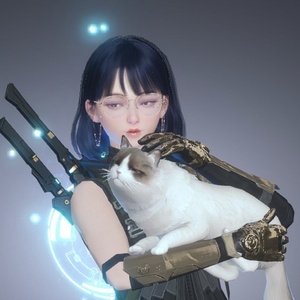


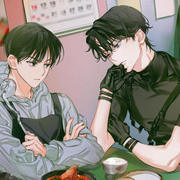
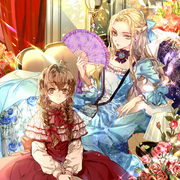

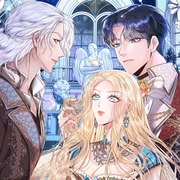

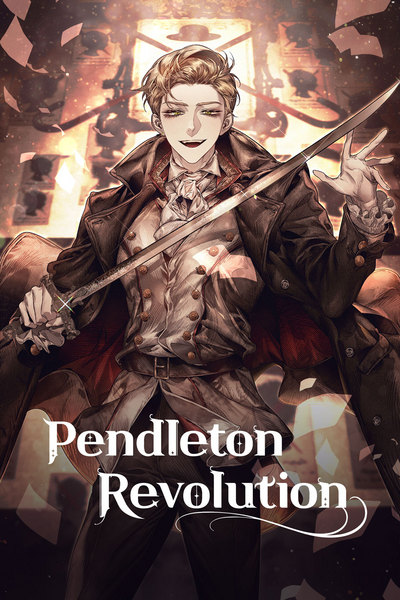
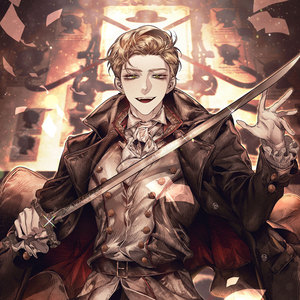
Comments (8)
See all